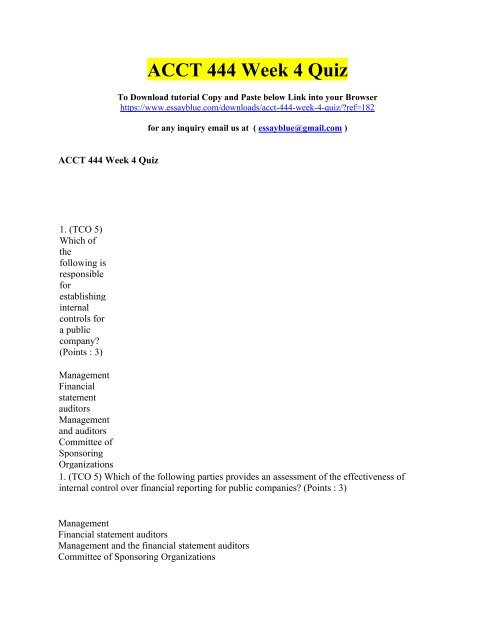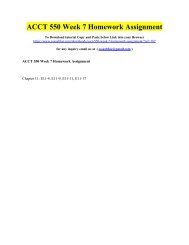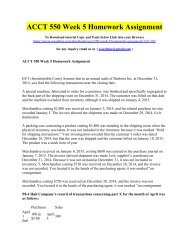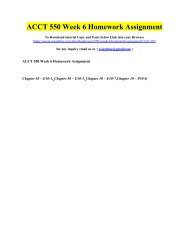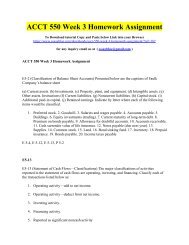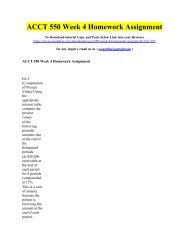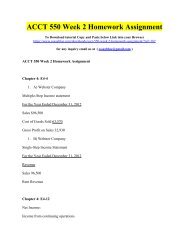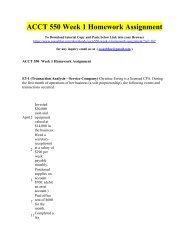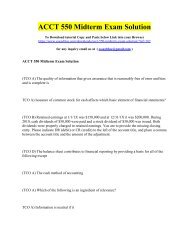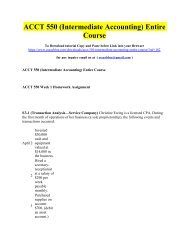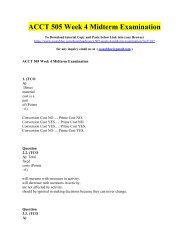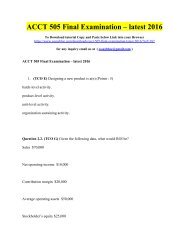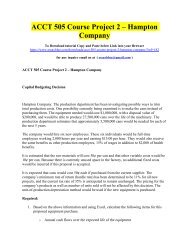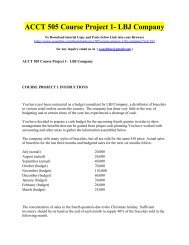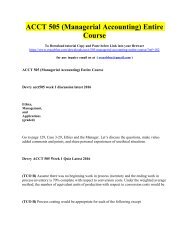ACCT 444 Week 4 Quiz
ACCT 444 Week 4 Quiz
ACCT 444 Week 4 Quiz
Create successful ePaper yourself
Turn your PDF publications into a flip-book with our unique Google optimized e-Paper software.
<strong>ACCT</strong> <strong>444</strong> <strong>Week</strong> 4 <strong>Quiz</strong><br />
To Download tutorial Copy and Paste below Link into your Browser<br />
https://www.essayblue.com/downloads/acct-<strong>444</strong>-week-4-quiz/?ref=182<br />
for any inquiry email us at ( essayblue@gmail.com )<br />
<strong>ACCT</strong> <strong>444</strong> <strong>Week</strong> 4 <strong>Quiz</strong><br />
1. (TCO 5)<br />
Which of<br />
the<br />
following is<br />
responsible<br />
for<br />
establishing<br />
internal<br />
controls for<br />
a public<br />
company?<br />
(Points : 3)<br />
Management<br />
Financial<br />
statement<br />
auditors<br />
Management<br />
and auditors<br />
Committee of<br />
Sponsoring<br />
Organizations<br />
1. (TCO 5) Which of the following parties provides an assessment of the effectiveness of<br />
internal control over financial reporting for public companies? (Points : 3)<br />
Management<br />
Financial statement auditors<br />
Management and the financial statement auditors<br />
Committee of Sponsoring Organizations
1. (TCO 5)<br />
Which of<br />
the<br />
following is<br />
responsible<br />
for<br />
establishing<br />
a private<br />
company’s<br />
internal<br />
control?<br />
(Points : 3)<br />
Management<br />
Auditors<br />
Management and auditors<br />
Committee of Sponsoring Organizations<br />
2. (TCO 5)<br />
Which<br />
section of<br />
the<br />
Sarbanes-<br />
Oxley Act<br />
requires<br />
management<br />
to issue an<br />
internal<br />
control<br />
report?<br />
(Points : 3)<br />
202<br />
203<br />
404<br />
408
2. (TCO 5)<br />
Sarbanes-<br />
Oxley<br />
requires<br />
management<br />
to issue an<br />
internal<br />
control report<br />
that includes<br />
two specific<br />
items. Which<br />
of the<br />
following is<br />
one of these<br />
two<br />
requirements?<br />
(Points : 3)<br />
A statement that management is responsible for establishing and maintaining an adequate<br />
internal control structure and procedures for financial reporting<br />
A statement that management and the board of directors are jointly responsible for establishing<br />
and maintaining an adequate internal control structure and procedures for financial reporting<br />
A statement that management, the board of directors, and the external auditors are jointly<br />
responsible for establishing and maintaining an adequate internal control structure and<br />
procedures for financial reporting<br />
None of the above<br />
2. (TCO 5)<br />
Internal<br />
control<br />
reports<br />
issued by<br />
public<br />
companies<br />
must<br />
identify the<br />
framework<br />
used to<br />
evaluate the<br />
effectiveness<br />
of internal<br />
control.
Which of the<br />
following is<br />
the most<br />
common<br />
framework<br />
in the U.S.?<br />
(Points : 3)<br />
Effective Internal Control Framework-AICPA<br />
Internal Control-Integrated Framework-COSO<br />
Enterprise Internal Control-COSO<br />
There is no common framework used in the U.S.<br />
3. (TCO 5)<br />
Which of<br />
the<br />
following<br />
activities<br />
would be<br />
least likely<br />
to<br />
strengthen<br />
a<br />
company’s<br />
internal<br />
control?<br />
(Points :<br />
3)<br />
Separating accounting from other financial operations<br />
Maintaining insurance for fire and theft<br />
Fixing responsibility for the performance of employee duties<br />
Carefully selecting and training employees<br />
3. (TCO 5)<br />
Management’s<br />
tests of<br />
operating<br />
effectiveness<br />
might include
which of the<br />
following<br />
types of<br />
procedures?<br />
(Points : 3)<br />
Inspection of relevant documentation<br />
Inquiries of personnel<br />
Reperformance of the application of controls<br />
All of the above<br />
3. (TCO 5)<br />
Which of<br />
management’s<br />
concerns with<br />
respect to<br />
implementing<br />
internal<br />
controls is the<br />
auditor<br />
primarily<br />
concerned?<br />
(Points : 3)<br />
Efficiency of operations<br />
Reliability of financial reporting<br />
Effectiveness of operations<br />
Compliance with applicable laws and regulations<br />
4. (TCO 5)<br />
Internal<br />
controls can<br />
never be<br />
regarded as<br />
completely<br />
effective.<br />
Even if<br />
company
personnel<br />
could design<br />
an ideal<br />
system, its<br />
effectiveness<br />
depends on<br />
the (Points :<br />
3)<br />
adequacy of the computer system.<br />
proper implementation by management.<br />
ability of the internal audit staff to maintain it.<br />
competency and dependability of the people using it.<br />
4. (TCO<br />
5) Even<br />
with the<br />
most<br />
effectively<br />
designed<br />
internal<br />
control,<br />
the auditor<br />
must<br />
obtain<br />
audit<br />
evidence,<br />
beyond<br />
testing the<br />
controls,<br />
for every<br />
(Points :<br />
3)<br />
transaction.<br />
financial statement account.<br />
material financial statement account.<br />
financial statement account that will be relied upon by third parties.<br />
4. (TCO 5)
The essence<br />
of an<br />
effectively<br />
controlled<br />
organization<br />
lies in the<br />
(Points : 3)<br />
effectiveness of its independent auditor.<br />
effectiveness of its internal auditor.<br />
attitude of its employers.<br />
attitudes of its management.<br />
5. (TCO<br />
5) Which<br />
of the<br />
following<br />
is not one<br />
of the<br />
levels of<br />
an<br />
absence<br />
of<br />
internal<br />
controls?<br />
(Points :<br />
3)<br />
Major deficiency<br />
Material weakness<br />
Significant deficiency<br />
Control deficiency<br />
5. (TCO 5)<br />
To<br />
determine<br />
if a<br />
significant<br />
internal<br />
control
deficiency<br />
or<br />
deficiencies<br />
are a<br />
material<br />
weakness,<br />
they must<br />
be<br />
evaluated<br />
on their<br />
(Points : 3)<br />
likelihood.<br />
materiality or significance.<br />
both A and B are correct.<br />
neither A nor B is correct.<br />
6. (TCO<br />
10)<br />
Which of<br />
the<br />
following<br />
is not a<br />
benefit of<br />
using ITbased<br />
controls?<br />
(Points :<br />
3)<br />
Ability to process large volumes of transactions<br />
Ability to replace manual controls with computer-based controls<br />
Reduction in misstatements due to consistent processing of transactions<br />
Over-reliance on computer-generated reports<br />
6. (TCO<br />
10)<br />
Which of<br />
the<br />
following
is not a<br />
risk to IT<br />
systems?<br />
(Points :<br />
3)<br />
Need for IT experience<br />
Separation of IT duties<br />
Improved audit trail<br />
Hardware and data vulnerability<br />
6. (TCO 10)<br />
Which of the<br />
following is<br />
not a risk<br />
specific to IT<br />
environments?<br />
(Points : 3)<br />
Reliance on the functioning capabilities of hardware and software<br />
Increased human involvement<br />
Loss of data due to insufficient backup<br />
Reduced segregation of duties<br />
7. (TCO<br />
10)<br />
Which of<br />
the<br />
following<br />
IT duties<br />
should be<br />
separated<br />
from the<br />
others?<br />
(Points:3)<br />
Systems development<br />
Operations
Data control<br />
All of the above<br />
7. (TCO 10)<br />
The extent<br />
to which IT<br />
duties are<br />
separated in<br />
an<br />
organization<br />
depends on<br />
(Points : 3)<br />
the organization’s size.<br />
the organization’s complexity.<br />
both A and B.<br />
neither A nor B.<br />
7. (TCO 10)<br />
Programmers<br />
should do all<br />
but which of<br />
the<br />
following?<br />
(Points : 3)<br />
Test programs for proper performance<br />
Evaluate legitimacy of transaction data input<br />
Develop flowcharts for new applications<br />
Programmers should perform each of the above<br />
8. (TCO<br />
10)<br />
Which of<br />
the<br />
following
is a<br />
category<br />
of<br />
general<br />
controls?<br />
(Points :<br />
3)<br />
Processing controls<br />
Output controls<br />
Physical and online security<br />
Input controls<br />
8. (TCO<br />
10)<br />
General<br />
controls<br />
include<br />
all of the<br />
following<br />
except<br />
(Points :<br />
3)<br />
systems development.<br />
online security.<br />
processing controls.<br />
hardware controls.<br />
8. (TCO 10)<br />
Which of the<br />
following is<br />
least likely to<br />
be used in<br />
obtaining an<br />
understanding<br />
of client<br />
general<br />
controls?<br />
(Points : 3)
Examination of system documentation<br />
Inquiry of client personnel (e.g. key users)<br />
Observation of transaction processing<br />
Reviews of questionnaires completed by client IT personnel<br />
9. (TCO<br />
10)<br />
Controls<br />
that<br />
apply to<br />
a<br />
specific<br />
element<br />
of the<br />
system<br />
are<br />
called<br />
(Points :<br />
3)<br />
user controls.<br />
general controls.<br />
systems controls.<br />
application controls.<br />
9.<br />
(TCO<br />
10) A<br />
control<br />
that<br />
relates<br />
to all<br />
parts<br />
of the<br />
IT<br />
system<br />
is<br />
called<br />
a(n)<br />
(Points<br />
: 3)<br />
general control.<br />
systems control.
universal control.<br />
applications control.<br />
9. (TCO<br />
10)<br />
Auditors<br />
should<br />
evaluate<br />
the _____<br />
before<br />
evaluating<br />
application<br />
controls<br />
because of<br />
the<br />
potential<br />
for<br />
pervasive<br />
effects.<br />
(Points : 3)<br />
input controls<br />
control environment<br />
processing controls<br />
general controls<br />
10. (TCO<br />
10) Which<br />
of the<br />
following<br />
is not an<br />
example of<br />
an<br />
application<br />
control?<br />
(Points: 3)<br />
An equipment failure causes system downtime.<br />
There is a preprocessing authorization of the sales transactions.<br />
There are reasonableness tests for the unit selling price of a sale.
After processing, all sales transactions are reviewed by the sales department.<br />
10. (TCO<br />
10) Which<br />
of the<br />
following<br />
is not a<br />
category<br />
of an<br />
application<br />
control?<br />
(Points : 3)<br />
Processing controls<br />
Output controls<br />
Hardware controls<br />
Input controls<br />
10. (TCO<br />
10) Which<br />
of the<br />
following<br />
statements<br />
related to<br />
application<br />
controls is<br />
correct?<br />
(Points : 3)<br />
Application controls relate to various aspects of the IT function, including software acquisition<br />
and the processing of transactions.<br />
Application controls relate to various aspects of the IT function, including physical security and<br />
the processing of transactions in various cycles.<br />
Application controls relate to all aspects of the IT function.<br />
Application controls relate to the processing of individual transactions.


